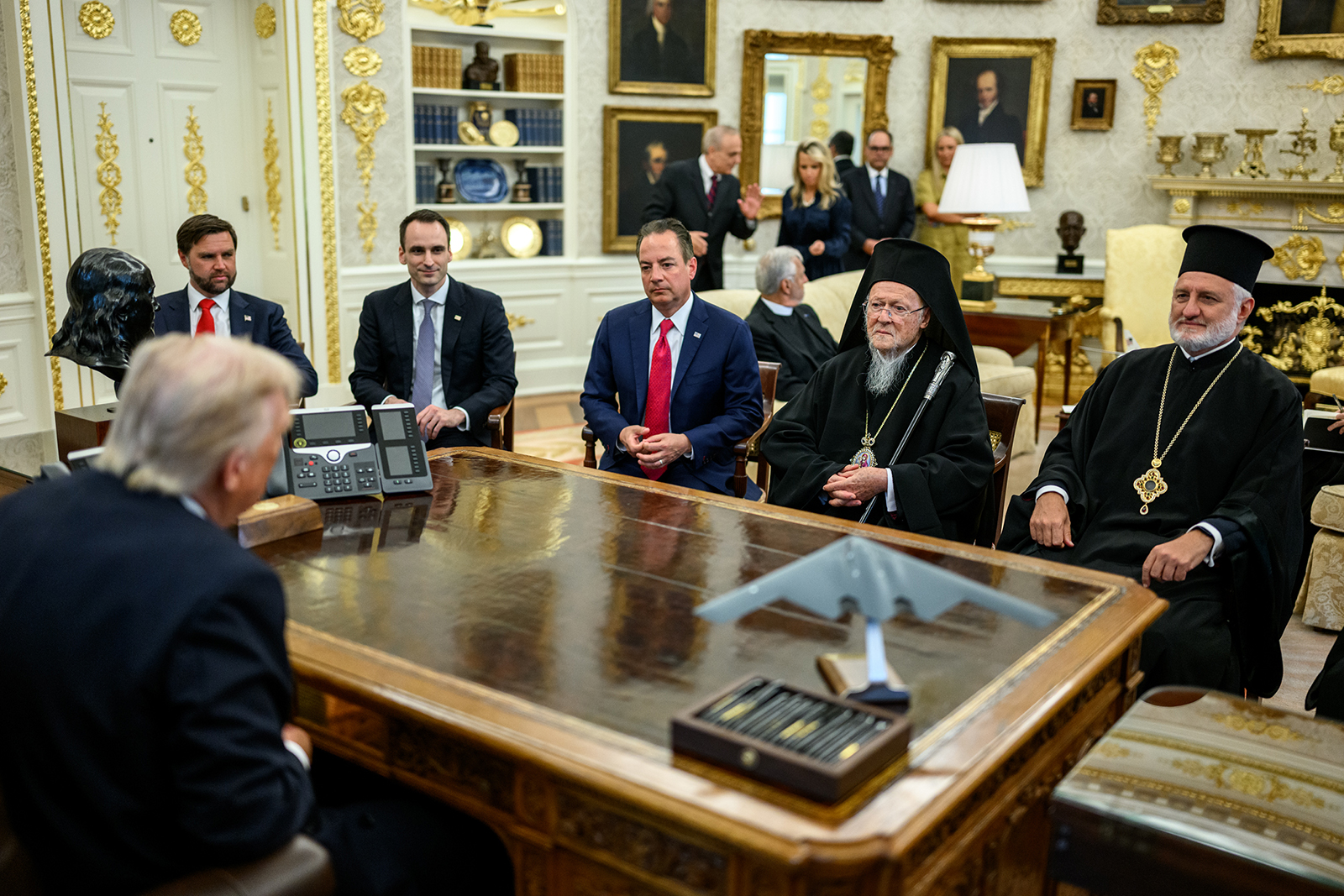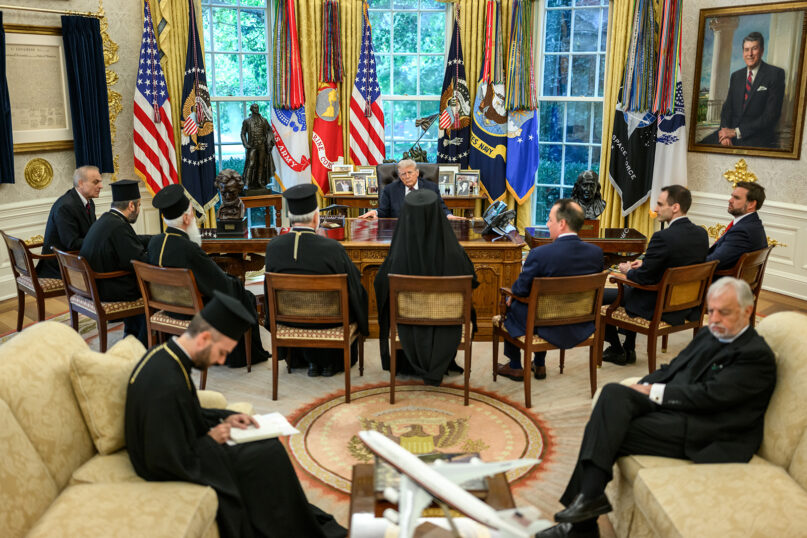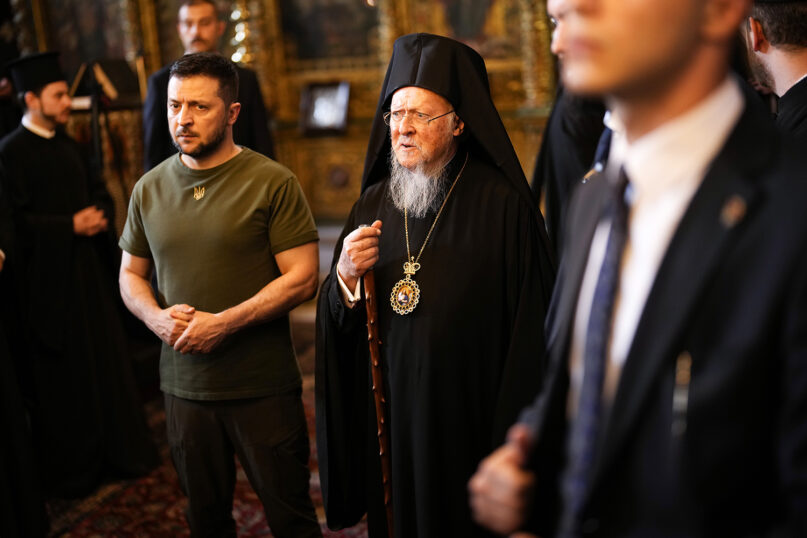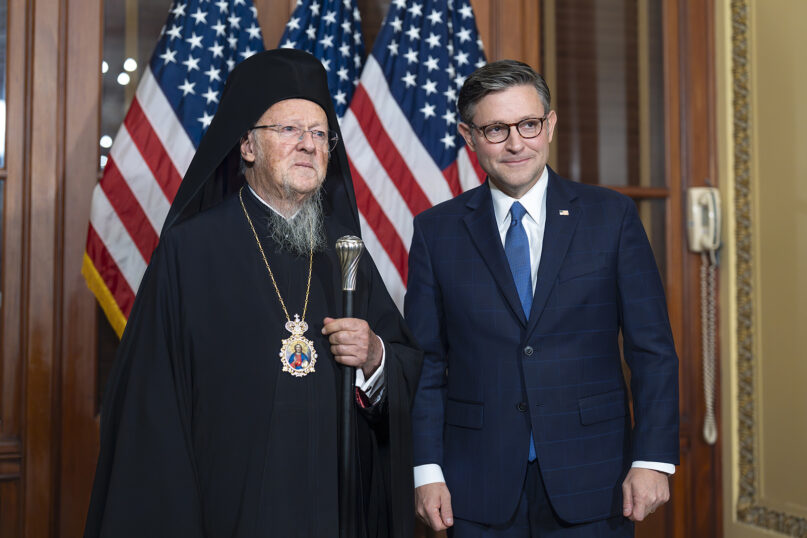
(RNS) — Bartholomew I, the ecumenical patriarch of Constantinople and one of Orthodox Christianity’s most influential leaders, has begun a nearly two-week apostolic visit to the United States that included a meeting with President Donald Trump.
The trip, which began Monday (Sept. 15), is the first in four years for the Istanbul-based church hierarch and his eighth since he was installed in 1991. In addition to meetings with Greek Orthodox Americans, the patriarch spoke before the State Department and with Vice President JD Vance and congressional leaders. Bartholomew will also accept an award for his environmental activism next week.
Under the Greek Orthodox Archdiocese of America, which is an arm of the Ecumenical Patriarchate, the church has some 1.5 million faithful in the U.S., and more than 500 parishes and 20 monasteries.
Trump is the sixth U.S. president he has met. During their hourlong meeting, the two broached many topics, including the assassination of Charlie Kirk, Orthodox-Catholic relations and Turkey’s Christian minority. The patriarch also addressed Trump’s efforts to broker a truce in the Russia-Ukraine war, thanking him for his work toward ending the war.
Bartholomew has been a strong backer of the Ukrainian Orthodox church’s independence from Russia for many years. In 2018, he used his authority as ecumenical patriarch — a role that has historically served as a mediator between the Orthodox world and many independent churches — to formalize Ukrainian Orthodox Christians’ separation from the Russian Orthodox Church and its Moscow-based, and aligned, patriarch. The move sparked a schism between the Moscow Patriarchate, the world’s largest Orthodox church body, and Constantinople.

President Donald Trump participates in a bilateral meeting with the Ecumenical Patriarch Bartholomew, Monday, Sept. 15, 2025, in the Oval Office. (Official White House Photo by Daniel Torok)
The independence of the Ukrainian church from the Moscow Patriarchate, and the suppression of churches still tied to Moscow, has been a sore point not just for the Russian church but for Russia itself. Several of Russia’s peace proposals call for protecting Russian-aligned churches and banning an independent Ukrainian church.
In an interview with a French television station last week, Bartholomew reiterated his support for the Ukrainian church’s independence.
“The Ecumenical Patriarchate does not intend to revoke its decision to grant autocephaly to Ukraine. I want to clearly state this,” Bartholomew said.
“Our goal is to unite all the Orthodox churches of Ukraine, both those of Metropolitan Onufriy and those of Metropolitan Epiphanius, so that they unite at the theoretical level and in everyday life, become a single local church and be recognized by other sister Orthodox churches,” he continued. “I think that sooner or later, it will happen. We should not expect it to happen overnight. Let us recall that the autocephaly of other churches was also not recognized immediately. It took other Orthodox churches time to realize the autocephaly of the new church. I believe that with God’s grace and the goodwill of the Orthodox sister churches this will happen in the coming years or decades.”
Speaking to the Council on Foreign Relations on Friday (Sept. 19), he doubled down on his criticism of the Russian church, specifically mentioning Russkiy mir, or Russian world, ideology, used to justify the war in Ukraine.
“The Orthodox Church of Russia has given its ringing endorsement to the invasion of Ukraine and the murder of fellow Orthodox Christians by the Putin regime,” he said. “It has done so in service to the outdated and outlandish imperial philosophy of Russkiy mir, which has been growing since the fall of the Soviet Union.”

FILE – Ukrainian President Volodymyr Zelenskyy, left, stands next to Ecumenical Patriarch Bartholomew I, the spiritual leader of the world’s Orthodox Christians, at the Patriarchal Church of St. George in Istanbul, Turkey, Saturday, July 8, 2023. Zelenskyy attended a memorial ceremony for the victims of the war in Ukraine led by Patriarch Bartholomew I. (AP Photo/Francisco Seco)
The patriarch also rejected the intertwining of church, state and nationalism at a dinner hosted by the State Department.
“In times past, religion was used to consolidate peoples around specific governments, giving coherence to earthly empires, kingdoms and nation-states,” he said. “… Has not the human family arrived at a point when such rigid forms of conformity no longer serve the interests of the people? As the ecumenical patriarchate, we seek to foster interreligious dialogue, mutual respect and an understanding of coexistence that often eludes the nations of the world.”
During his meetings with U.S. leaders, Bartholomew also brought attention to Turkey’s Greek-speaking and other Christian minorities. Once home to millions of Christians of various denominations, today, Christians account for less than 1% of Turkey’s population — a result of a turbulent 20th century, which included acts of genocide and ethnic cleansing at the close of World War I and the dissolution of the Ottoman Empire.
While the patriarch was before Congress, Florida Republican Congressman Gus Bilirakis, who is of Greek descent, called on the U.S. to pressure Ankara to reopen the Halki Seminary. A Greek Orthodox theological school on an island off the coast of Istanbul, Halki was the last school to train Christian priests in Turkey before it was closed by the Turkish government in 1971. Since then, its fate has been an important issue for Turkey’s Orthodox Christian minority and a sticking point in Greek-Turkish relations.

Speaker of the House Mike Johnson, R-La., right, welcomes the leader of the Orthodox Christian Church, Ecumenical Patriarch Bartholomew I, left, for a meeting in the speaker’s office at the Capitol in Washington, Wednesday, Sept. 17, 2025. (AP Photo/J. Scott Applewhite)
Next week, Bartholomew is set to accept the 2025 Templeton Prize, awarded by the U.S.-based John Templeton Foundation, in recognition of his environmental advocacy that has earned him the moniker “green patriarch.” Since his enthronement in 1991, Bartholomew has avidly proclaimed that church leaders have a responsibility to take a stance on environmental issues. He brought scientists and other environmental scholars to Istanbul and other properties of the church for seminars on the subject, stretching back decades.
“For over 30 years, Bartholomew has articulated a compelling moral and theological vision of humanity’s responsibility to care for the Earth and to uphold harmony, unity and mutual love within and across religious communities,” The Templeton Foundation said in April when naming him the recipient of the prize. “He has consistently exhorted people of faith to view their relationship to creation as a sacred duty, arguing that making a false historical divide between the material and spiritual can deny the significance of environmental degradation.”
